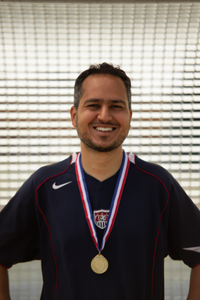The Science of Excellence

Photo by Peter Muller/Getty Images
The Science of Excellence
What makes some people standouts—and what the rest of us can learn from them
More than 15 million people play baseball in America, from tiny T-ballers to rusty weekend warriors. Plenty harbor dreams of hitting a World Series home run, but with only around 1,000 spots on big league rosters, they have a better chance of winning an Academy Award—a one in 11,500 shot, according to Forbes—than swinging a bat at Fenway Park.
Edson Filho is interested in what separates those who make it to the top from the rest of us: how pro players and teams not only excel, but keep pulling out game-winning performances.
An associate professor of sports psychology and counseling, he’s looked at the traits shared by the best of the best, from Olympic athletes to virtuoso musicians to leading circus acts.

“There is a science behind excellence,” says Filho, a certified mental performance consultant and member of the United States Olympic & Paralympic Committee’s sport psychology registry. “To be there at the top of the pyramid, you need a large base: mental skills, a learning approach, a strength-based approach. You really have to practice your mental game and make it a priority. Instead of worrying about what you’re lacking, look at how you can grow.”
By using statistical modeling, biofeedback, and brain imaging, he can see what’s happening in elite performers’ brains as they prepare for games, recover from setbacks, and cope with stress. He’s examined how top teams come together for a greater goal, studying team dynamics theory and what he calls shared zones of optimal functioning.
Filho talked with BU Wheelock about what he’s learned from studying performance optimization and how educators and others can apply his findings in their lives and work.
BU Wheelock: What are the common traits of people who excel all the time—and what can we learn from them?
Filho: A lot of things separate high-performing individuals from low-performing individuals. And it is in terms of how they think, how they feel, and how they behave: We call it the cognitive-affective-behavioral link. It is also their ability to self-regulate. The psychology of the self is pretty big: there’s self-concept, self-esteem, self-confidence, self-efficacy or task-specific confidence, self-compassion. High-performing individuals always practice to improve, they’re always working on their potential. We know they tend to appraise a situation as a challenge rather than a threat. The other element is the environment. We know from research that if you have a good coach, that helps a lot—and the right coach at the right time. If you start practicing with the best clubs, you get the best environment to develop.
You play soccer. Has studying psychology improved your game?
Yes, because not only have I studied it, I’ve internalized it. For instance, one of the most studied things in sport psychology is anxiety. Performers get anxious because of essentially two things: preparation and how important the event is. If you have a math test tomorrow and you prepare, you get less anxious. For something important, you’re always going to be a little anxious; you cannot lie to yourself. High-performing people, like [Olympic sprinter] Usain Bolt, love the pressure, embrace that pressure. If you are well prepared and mindful about it, it makes you function better.
How can teachers use your research to help the kids in their classrooms excel?
You need to know the mental skills or the coping skills that are important. In England now, most big soccer clubs have sport psychologists, so the kids are learning those things from people with expertise. That should be for everybody. Imagine a kid going to the top soccer clubs in England, learning from experts about visualization, gratitude, resilience, mental toughness, self-confidence from an early age. You need a curriculum, just like you need a curriculum for math or languages. Psychological skills training could be, and should be, taught from an early age.
At work, most of us are part of a team. What separates the winning teams from the losing ones?
High-performing teams have high task cohesion: everybody knows what they should do, everybody has a unique value contribution. If a player thinks they’re not contributing, cohesion is going to drop. And social cohesion, whether they like each other, makes a difference. The other one is leadership. What’s the best leadership model? Sometimes you have to make the decision, sometimes you have to be democratic, sometimes you have to be a transactional or transformational leader. But that all varies with the situation. A team might lose because, for a given situation, the coach had to be democratic and chose to be autocratic, or task cohesion was high, but social cohesion was low, or the team has a lot of shared knowledge but no people with complementary skills. It’s complex.
It seems like a lot has to go right to succeed.
Most successful people are task-oriented—they want to improve their performance in the task instead of comparing themselves with others all the time. There’s always somebody better than you, there’s always somebody faster than you, and if you compare yourself all the time, you’ll burn out and eventually quit. Excellence is a multilayered process. A lot of people don’t know what to change at the individual level, don’t know how to make positive changes at the group level, and don’t know how to change the structures. But nobody reaches higher levels of performance and stays there without social support. I haven’t seen one single expert who reached the top alone. There are parents or a coach, there’s a partner, there’s government funding—somebody believed in you.
This interview was edited and condensed for clarity.